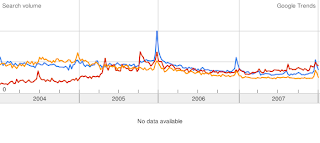After my posts about sluggy pixels and shiny pixels, I think it's only fair to mention the wooden pixels developed in 1999 too. Frame rates are quite acceptable, but there's no color. They even made a wooden mirror out of them. Here's a video on YouTube.
January 25, 2008
Wooden pixels
January 21, 2008
Display pixels versus capture pixels
One of the artificial questions I've been pondering a bit is what we will see more of: pixels that capture light (cameras) or pixels that make up displays? For several years my prediction was that soon we'd see more cameras than displays in the world. The reasoning was that displays are relatively large and made to be seen by a human. Cameras are tiny though and have many uses. Cameras don't need humans to look at the images captured, they can simply be stored, or analyzed by an algorithm running on a piece of silicon. Since there's only a little over 6 billion of us to view the screens, soon we'd have more cameras than displays.
Some cell-phones include two cameras, one for video conferencing and one for taking snapshots. These only have one display, which confirmed that I was right. Soon we'll have more cameras than displays.
Still, the other day I saw a very small digital photo frame which cost only 15 euro and was meant to be worn on a key chain. It could hold 30 photos or so and contained a tiny battery. This caused me to think that the cross over point of having more cameras world-wide than displays is quite far away. We'll soon have displays on our credit cards, on the outside of our laptops and perhaps even on our clothes.
Do you think we will ever have more cameras than displays?
January 16, 2008
Pixel compression trends
I recently ran across this Google Trends utility that keeps track of the number of times that certain terms are used on the web. Click on the image to see the trends of MPEG-2, MPEG-4 and H.264, showing that H.264 clearly passed MPEG-4 in 2007. Any trends in the world of pixels that you'd like to add? Please leave a link to them into the comment section.
Any trends in the world of pixels that you'd like to add? Please leave a link to them into the comment section.
January 15, 2008
Post-processing pixel companies going away?
Recently, two chip makers that focused on post-processing were acquired by bigger companies. Sigma Designs acquires Gennum's image processing business, and ST acquires Genesis Microchip. The acquiring companies provide single-chip video processing solutions which include such post-processing functionality, but until now their post-processing wasn't as good as what the smaller focused companies could deliver. The market demands ever increasing picture quality at ever reducing price points, which these acquiring companies are looking to achieve with their acquisitions.
January 14, 2008
One year ago: analog pixels switched off
It's been a year since they turned off all over-the-air analog broadcast of TV signals in the Netherlands. I haven't heard a complaint since. Only about 74,000 households picked up the analog signals before, so that was to be expected. The extra bandwidth that became available unfortunately are now used to transmit encoded signals, which you have to pay KPN a monthly fee for to view. In return for the free over the air bandwidth, KPN built and maintains the digital broadcasting masts and systems. Sounds like a pretty good trade for the KPN to me, and a lousy trade for the government and us tax payers. My guess is that it is this monthly fee that is severely reducing the market introduction of digital portable TV receivers for in the car, mobile phones, etc. Even in the home it'd be handy -- when was the last time you pulled a cable through your house?
Do any of you understand why we still have to pay for TV channels transmitted over the air while they contain more than 10 minutes of paid advertising per hour?
January 11, 2008
Discontinued pixels
In March of 1993 Jim Blinn, perhaps the ultimate pixel guru, wrote an article called "NTSC: Nice Technology, Super Color". It's a play on what people often say NTSC means: Never The Same Color. The last few sentences of the article read this: "Current plans call for the FCC to adopt a new high-definition television standard some time this year. The FCC will then strongly encourage all broadcasters to switch over to the new standard as soon as possible. By the year 2007, the FCC wants this conversion to HDTV to be complete. Broadcasters will no longer be allowed to use NTSC. Boo hoo.". Well, HD is happening, but NTSC is still alive and will be for quite some time to come.
What's your guess: when will Standard Definition truly die?
